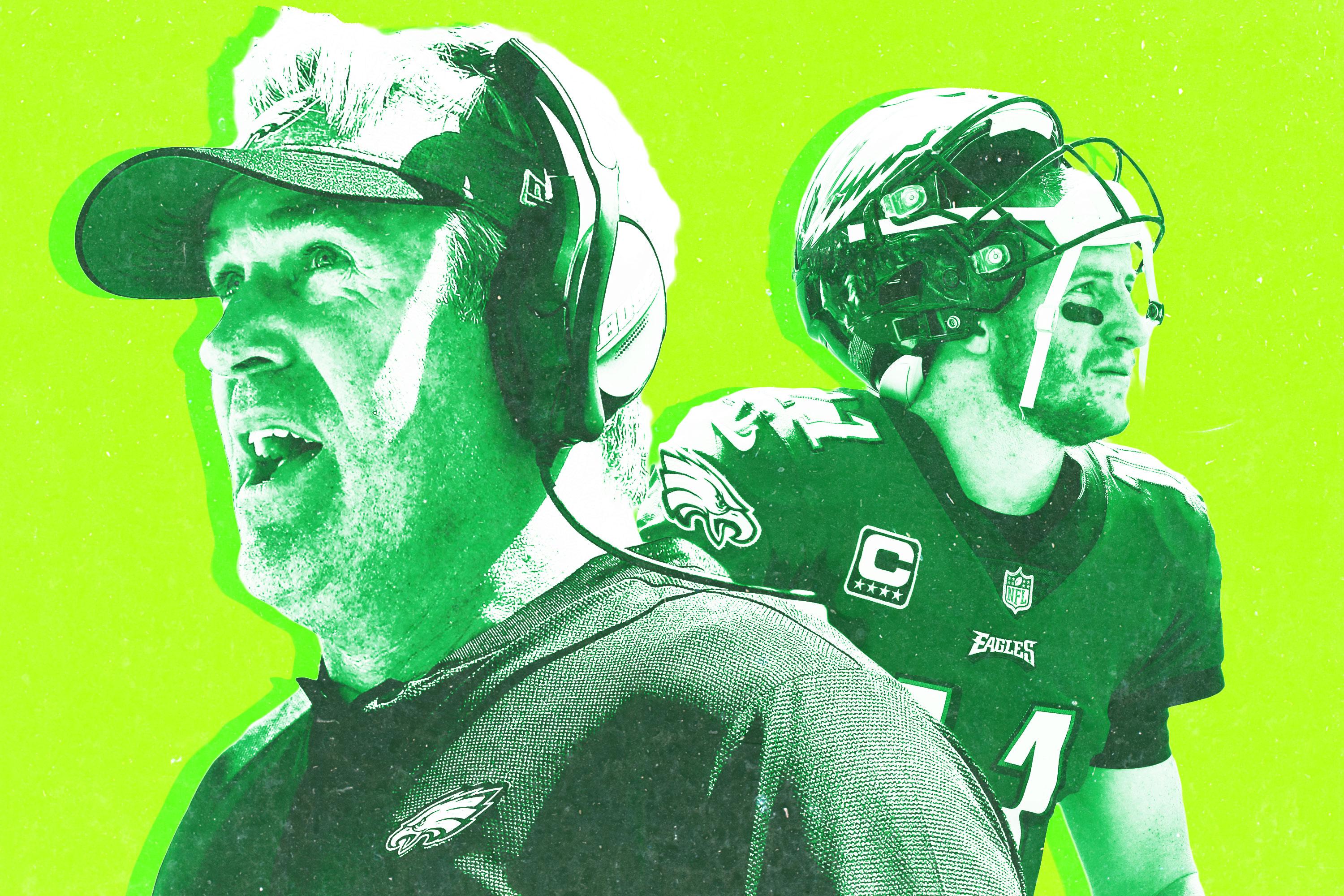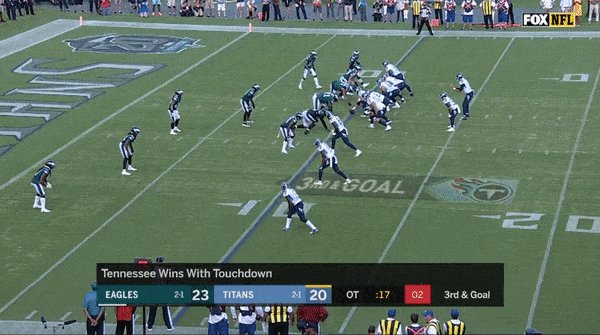
Carson Wentz’s return was supposed to be the magic elixir that fixed a struggling Eagles team. With backup QB Nick Foles under center, the defending Super Bowl champions had slogged through their first two games of the season: an uninspiring slugfest with the Falcons in Week 1 and a shocking loss to Fitzmagic and the Bucs in Week 2. The Philly starter was medically cleared ahead of Week 3, finally completing his comeback from the brutal knee injury he suffered late in 2017, and the team was poised to get the jolt it needed. Instead, a crushing 26-23 overtime loss to the Titans on Sunday leaves the Eagles at 2-2 and looking quite different than the team that stormed through the NFC last season.
Wentz is not to blame here. After a slow start in his debut against the Colts last week, he looked much like the Carson Wentz of old against Tennessee. He synced up with Alshon Jeffery (in the receiver’s first game back after his own prolonged absence due to injury) throughout the game, consistently found tight end Zach Ertz in the middle of the field, and seemed comfortable sliding up in the pocket against a relentless onslaught of pressure from an underrated Titans defense. In that way, head coach Doug Pederson’s team looks a lot like last season’s championship version. But elsewhere on the field are subtle discrepancies that have had an impact over the first quarter of the season.
Despite suffering some midyear injuries in 2017, the Eagles defense was relatively intact by the time the playoffs started. They had lost linebacker Jordan Hicks to a ruptured Achilles in late October, but got cornerback Ronald Darby back from an ankle injury just three weeks later. When it was time to make a playoff run, the unit was close to full strength.
Not even a month into the 2018 season, the types of injuries Philadelphia avoided last year have already struck. Safety Rodney McLeod was placed on IR last week after knee surgery to repair an injured MCL, and the high-priced free agent’s absence was noticeable against the Titans. On several of Tennessee’s deep shots, including Marcus Mariota’s crucial 51-yard completion to wide receiver Corey Davis midway through the fourth quarter, the Titans’ play designs drew replacement free safety Corey Graham toward the line of scrimmage while vertical routes developed behind him. And late in overtime, with the Titans down three and looking for the walk-off win, rookie cornerback Avonte Maddox wound up checking Davis in the end zone. The result was a spectacular leaping catch for the game-winning touchdown.

Teams could do significantly worse than Graham as a replacement for a top-flight free safety like McLeod—Graham has been a reliable starter and depth player for plenty of great Chicago and Baltimore defenses over the course of his 12-year career. But he’s also 33 years old, and even if the talent drop-off between his level and McLeod’s isn’t calamitous, it still matters.
That sort of marginal decline has plagued the entire Eagles defense this season. Second-year cornerback Sidney Jones has stepped in and played well in the slot for departed free agent Patrick Robinson, but a key pass-interference call against Jones on fourth-and-4 late in overtime kept the Titans’ hopes alive. Ronald Darby and Jalen Mills were the starting corners on last season’s Super Bowl team, but both have taken a slight step back early in 2018, and that showed Sunday as they had trouble keeping pace with Tennessee’s young, dynamic receivers. As cracks start to form on the back end of a defense—whether they’re small downgrades in personnel or slight regressions from entrenched starters—the unit suddenly becomes susceptible to the chunk plays and maddening third- and fourth-down failures that haunted the Eagles in this week’s fourth quarter and overtime.
Similar understated issues hindered the Eagles offense Sunday. Philadelphia’s offensive line remains the most complete group in the NFL, but it struggled with the Titans’ talented defensive front. Defensive linemen Jurrell Casey and DaQuan Jones routinely got pressure up the middle against guards Brandon Brooks and Stefen Wisniewski. Well-timed blitzes from cornerback Malcolm Butler and linebacker Jayon Brown led to major sacks. Brown’s came on a first-and-10 to open the fourth quarter and aided the Titans’ comeback by short-circuiting a key Eagles drive. Tennessee defensive coordinator Dean Pees dialed up a blitz off the left side, and Brown was left relatively unblocked. It’s unclear what the Eagles’ blitz pickup rules should have been on that play, but right tackle Lane Johnson didn’t pick up anyone as Wentz was dumped to the turf. That sack may have not been Johnson’s fault, but when rookie pass rusher Harold Landry screamed off the edge two plays later and hammered Wentz so hard it jarred the ball loose for a pivotal strip-sack (one the Titans went on to recover), Johnson was responsible. Landry has shown plenty of burst around the corner early in his career, but when any rusher is beating the league’s most athletic right tackle with speed alone, your offense is probably having a tough day.
As Johnson and the rest of the line allowed an unusual amount of pressure, the receiving corps was busy dropping passes in vital moments. From a player like Jordan Matthews, who was signed September 19 following Mike Wallace’s season-ending ankle injury, that’s to be expected, but Nelson Agholor also had trouble holding onto the ball in big spots Sunday. Agholor’s drop on third-and-6 with 8:09 left in the fourth quarter gave the ball to Tennessee, and that drive ended in a touchdown strike from Mariota to wide receiver Tajae Sharpe—yet another play when the Titans exploited the Eagles defense over the middle of the field. Drops and sacks both played a major role in Philly’s abysmal 5-for-15 performance on third down, and that inability to sustain drives gave Tennessee plenty of opportunities to claw its way back from a 14-point second-half hole.
Even in ideal circumstances, Wentz and the Eagles replicating their 2017 third-down mastery this season would’ve been unlikely. Wentz completed 65.3 percent of his third-down passes last year with a ridiculous 123.7 quarterback rating. That level of success is nearly impossible to sustain from season to season, but Sunday’s issues went beyond textbook regression. The Eagles lost key assistants Frank Reich (now the head coach of the Colts) and John DeFilippo (who left to coordinate the Vikings offense) this offseason, and it’s natural to wonder whether the team’s revolutionary system can continue without the brain trust of coaches who cooked it up. But Philly’s third-down issues against the Titans had much more to do with player error than a lack of schematic advantage. Receivers were open. Wentz found them. Yet the faintest differences across the roster were enough to leave the door open just a crack.
On an off day, the defending champs still had countless chances to slam that door shut. Tennessee had three fourth downs on its game-winning overtime drive. The final one came on a short flip to running back Dion Lewis, who took the pass 17 yards to the Philadelphia 15-yard line. Lewis tortured the Eagles in Sunday’s second half and overtime as he hauled in six passes for 48 yards, including a clutch 17-yard gain on a second-and-22 late in the third quarter (the Titans went on to convert the manageable third down). A tackle in space here or less contact on an incompletion there, and the Eagles would be 3-1 and sitting atop the NFC East without much to worry about. But Philadelphia’s problems lie in the margins, which proved to be the difference against Tennessee. The Eagles still have one of the most talented rosters in football, and they’re in a division without significant competition, but a quarter of the way through the season, this team looks like the flawed cousin of the one that won the Super Bowl.